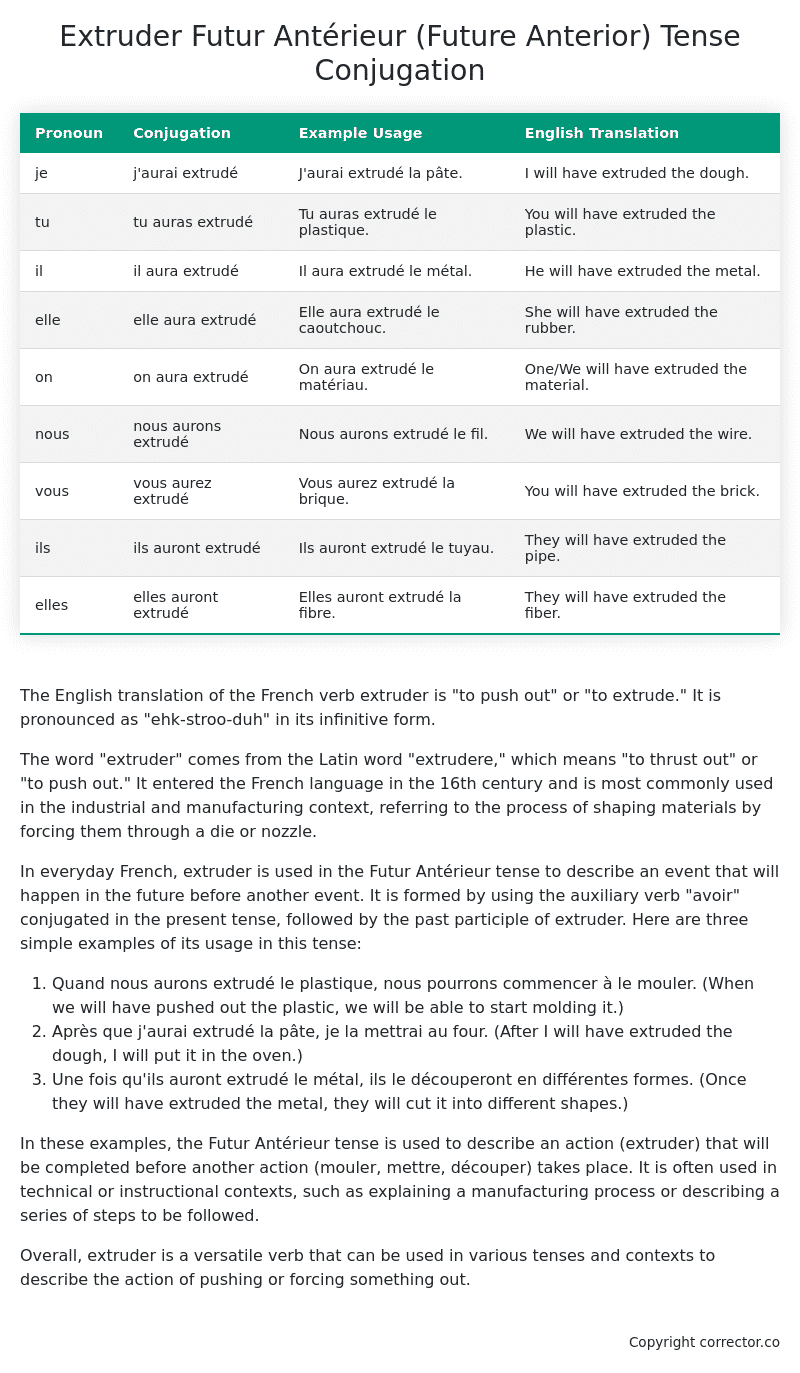Futur Antérieur (Future Anterior) Tense Conjugation of the French Verb extruder
Introduction to the verb extruder
The English translation of the French verb extruder is “to push out” or “to extrude.” It is pronounced as “ehk-stroo-duh” in its infinitive form.
The word “extruder” comes from the Latin word “extrudere,” which means “to thrust out” or “to push out.” It entered the French language in the 16th century and is most commonly used in the industrial and manufacturing context, referring to the process of shaping materials by forcing them through a die or nozzle.
In everyday French, extruder is used in the Futur Antérieur tense to describe an event that will happen in the future before another event. It is formed by using the auxiliary verb “avoir” conjugated in the present tense, followed by the past participle of extruder. Here are three simple examples of its usage in this tense:
- Quand nous aurons extrudé le plastique, nous pourrons commencer à le mouler. (When we will have pushed out the plastic, we will be able to start molding it.)
- Après que j’aurai extrudé la pâte, je la mettrai au four. (After I will have extruded the dough, I will put it in the oven.)
- Une fois qu’ils auront extrudé le métal, ils le découperont en différentes formes. (Once they will have extruded the metal, they will cut it into different shapes.)
In these examples, the Futur Antérieur tense is used to describe an action (extruder) that will be completed before another action (mouler, mettre, découper) takes place. It is often used in technical or instructional contexts, such as explaining a manufacturing process or describing a series of steps to be followed.
Overall, extruder is a versatile verb that can be used in various tenses and contexts to describe the action of pushing or forcing something out.
Table of the Futur Antérieur (Future Anterior) Tense Conjugation of extruder
| Pronoun | Conjugation | Example Usage | English Translation |
|---|---|---|---|
| je | j’aurai extrudé | J’aurai extrudé la pâte. | I will have extruded the dough. |
| tu | tu auras extrudé | Tu auras extrudé le plastique. | You will have extruded the plastic. |
| il | il aura extrudé | Il aura extrudé le métal. | He will have extruded the metal. |
| elle | elle aura extrudé | Elle aura extrudé le caoutchouc. | She will have extruded the rubber. |
| on | on aura extrudé | On aura extrudé le matériau. | One/We will have extruded the material. |
| nous | nous aurons extrudé | Nous aurons extrudé le fil. | We will have extruded the wire. |
| vous | vous aurez extrudé | Vous aurez extrudé la brique. | You will have extruded the brick. |
| ils | ils auront extrudé | Ils auront extrudé le tuyau. | They will have extruded the pipe. |
| elles | elles auront extrudé | Elles auront extrudé la fibre. | They will have extruded the fiber. |
Other Conjugations for Extruder.
Le Present (Present Tense) Conjugation of the French Verb extruder
Imparfait (Imperfect) Tense Conjugation of the French Verb extruder
Passé Simple (Simple Past) Tense Conjugation of the French Verb extruder
Passé Composé (Present Perfect) Tense Conjugation of the French Verb extruder
Futur Simple (Simple Future) Tense Conjugation of the French Verb extruder
Futur Proche (Near Future) Tense Conjugation of the French Verb extruder
Plus-que-parfait (Pluperfect) Tense Conjugation of the French Verb extruder
Passé Antérieur (Past Anterior) Tense Conjugation of the French Verb extruder
Futur Antérieur (Future Anterior) Tense Conjugation of the French Verb extruder (this article)
Subjonctif Présent (Subjunctive Present) Tense Conjugation of the French Verb extruder
Subjonctif Passé (Subjunctive Past) Tense Conjugation of the French Verb extruder
Subjonctif Imparfait (Subjunctive Imperfect) Tense Conjugation of the French Verb extruder
Subjonctif Plus-que-parfait (Subjunctive Pluperfect) Tense Conjugation of the French Verb extruder
Conditionnel Présent (Conditional Present) Tense Conjugation of the French Verb extruder
Conditionnel Passé (Conditional Past) Tense Conjugation of the French Verb extruder
L’impératif Présent (Imperative Present) Tense Conjugation of the French Verb extruder
L’infinitif Présent (Infinitive Present) Tense Conjugation of the French Verb extruder
Struggling with French verbs or the language in general? Why not use our free French Grammar Checker – no registration required!
Get a FREE Download Study Sheet of this Conjugation 🔥
Simply right click the image below, click “save image” and get your free reference for the extruder Futur Antérieur tense conjugation!

Extruder – About the French Futur Antérieur (Future Anterior) Tense
Construction
Common Everyday Usage Patterns
Interactions with Other Tenses
For example
Summary
I hope you enjoyed this article on the verb extruder. Still in a learning mood? Check out another TOTALLY random French verb conjugation!


